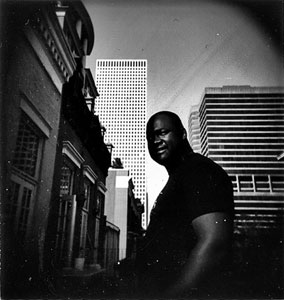 |
 |
Clarence Williams, a Pulitzer-prize winning photojournalist, was in New Orleans to attend and photograph the wedding of his cousin Jason (at left) when Hurricane Katrina struck. For three days and two nights he was stuck on the roof and in the attic of a house with family members while the waters rose. Helicopters and boats came by, but no one would rescue them until the third day. For several weeks he kept a diary in New Orleans; here are excerpts from two days in September: |
|
Saturday, September 17, 2005 “ …Now bear with me as I talk about the shooting at the rescuers. That was so uncool; I don’t understand the action, but I felt the sentiment myself. Here I am sitting on this roof during the day and in an attic at night surrounded by water, not having the slightest idea how far it stretches or how long it will be around, counting water and food, listening to the madness on a wind-up radio and watching an 85-year-old woman slowly, quietly perish, begging us to leave her. Not to mention it was hot, in the 90s. It appeared as though hundreds of helicopters hovered above randomly picking people up. At one point a cop came by in a boat. Before I could mention the sick old lady he motored off yelling he would be back. After 2 days and a night I realized he wasn’t returning. A pilot gave me a thumbs-up, and disappeared not to be seen again. On our second or third day, I’m thinking to myself, “If I shot (with a gun) near them maybe they would come arrest us, and we could sort it out later.” “Unc what are you thinking about?” I asked my uncle Sid. “If they pass over us one more time, I might have to shoot at them. At least that way they’ll have to come arrest us.” We never sought out the house AR-15 or pistol. But we did talk about the desire. Here’s what we came up with. Everyone would of felt so much better and behaved appropriately if our rescuers would have communicated with us by loudspeaker: ‘WE SEE YOU’ or ‘WOMEN CHILDREN AND THE SICK FIRST’ or ‘’TOMORROW’ or ‘JUST US NO BOATS BE PATIENT’ I’m in this Totally Black neighborhood trying to decide if race is playing a role in whether I’m getting rescued or not. Bizarre. An editor at my former employer once said to me with a straight face, “If I had to worry about race everyday I wouldn’t be able to get out of bed.” I wonder if he realizes how lucky he is? During a moment of life and death I had to think about race. There’s nothing easy about being poor and Black in the Big Easy. There are so many issues to touch on. I couldn’t believe after a day of radio news I referred to myself as a refugee. We have seen hurricanes Andrew, Hugo and Camille displace thousands and cost billions to recover from. The same with September 11th. I can’t recall any of those victims ever being called refugees. I continue to think. What was that other modern American Tragedy involving hundreds of thousands of Black folk? I can’t recall one. So I start to think about refugees, and take it to a dictionary. War plays a major role in all of the definitions. But in my world it is about those that are different from other Americans and usually because of war end up here. Wow, that’s heavy, I think to myself. I guess we aren’t just Americans. That didn’t cause me any consternation. My father, bless his soul, always said, “I’m an African.” Now I see why he left off that hyphen American part. Me, I’m black, somewhat educated and by the standards of many, somewhat successful. Given all that, I’ve never felt like a fully vested American when on these shores. As I absorb the social aftermath of Katrina that un-American feeling is intensified. Naw-Lens, The birthplace of one of America’s only true art forms, Jazz, will never be the same. Sunday, September 18, 2005 I hope I’m wrong, but it appears to me what was a larger Black city with all of the requisite big city problems will be no more. Naw-Lens is on the come-up for some. In its place will be a much whiter, wealthier smaller tourist-based-economy city. They allow a few poor Black folk back. New Orleans Land will need them for that authentic feel and for employees. There is no way all the destroyed uber-poor neighborhoods will be rebuilt. Who pays for this return trip? I’m glad I have my memories of the real Naw-Lens. I’m really going to miss that special place that helped me become me. |
||